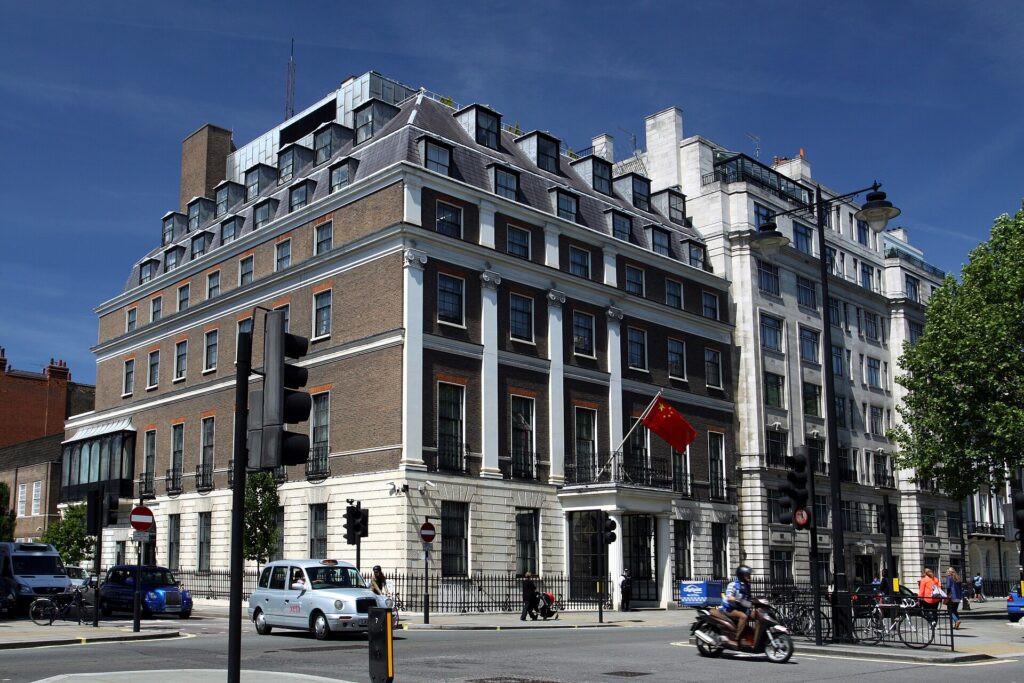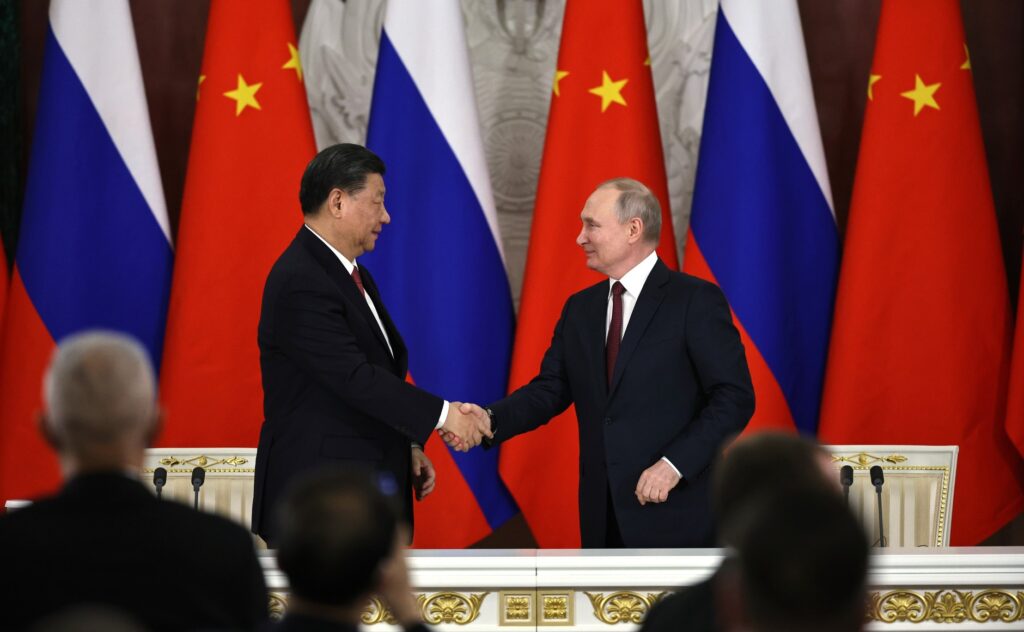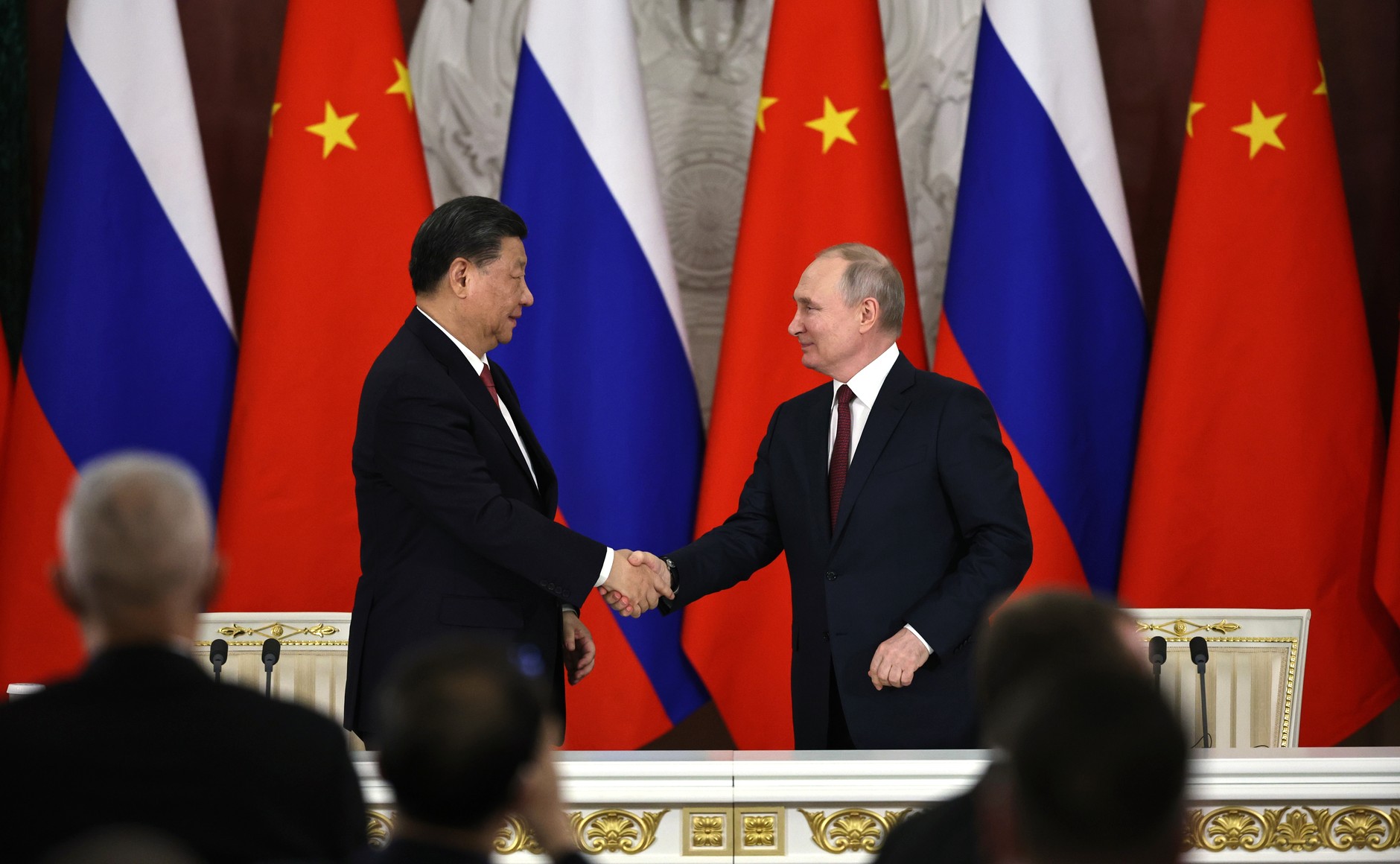Now Reading: What’s behind the massive mobilization against China’s Mega embassy in London?
-
01
What’s behind the massive mobilization against China’s Mega embassy in London?
What’s behind the massive mobilization against China’s Mega embassy in London?

More than 6,000 protesters gathered at the former Royal Mint Court in London on March 15, 2025, to protest against a proposed China mega-embassy project. The mobilisation, led by Hong Kong rights groups, Tibetans, Uyghurs, Taiwanese and local residents, was the second mass protest demanding the Labour government block the plan within two months.
Many protesters believe that China’s mega-embassy would serve as a “secret police station” which would execute the Chinese government’s transnational repression targeting political dissidents.
Protests against the China mega-embassy project emerged in early February 2025 after the British foreign and interior ministers under the Labour Prime Minister Keir Starmer signalled that the government would support China’s plan to transform the historic site of the former Royal Mint Court into its embassy.
The 2-hectare building complex, which was located near the Tower of London, was sold to China in 2018 for the country’s new London embassy. If approved, the plan will be the largest embassy of any country in all European countries. However, the Tower Hamlets Borough Council blocked the planning permission, citing potential public security risks caused by frequent protests. London police shared the council’s concerns.
Yet, near the end of 2024, the UK Labour government stepped in and overruled the local Council’s decision, stressing “the importance of countries having functioning diplomatic premises in each other’s capitals” and proposed that the controversy be resolved in a public hearing in mid-February and a final decision be made by May 2025.
Beijing reportedly hired a consultancy firm, Lowick, to resubmit the plan after Labour Party Leader Sir Keir Starmer became Prime Minister in mid-2024.
As the Labour government spoke out in support of the Chinese government’s plan, London police dropped opposition to the project, and the local council also decided not to argue against it:
The Metropolitan Police suddenly dropped opposition to China’s “super embassy” due to research paid for by Beijing
— Gabriel Pogrund (@Gabriel_Pogrund) January 26, 2025
Met claimed decisive evidence is “new”
When I challenged this, it admitted it’s an old doc used in previous planning application
🤔🤔🤔 https://t.co/kj0636TmIx
A coalition of more than 30 rights groups then decided to exercise pressure through protests. The first protest took place one week before the public hearing on February 8, 2025. Protesters fear that the mega-embassy would serve as China’s spy centre and facilitate transnational repression. Overseas Hong Kong Political Cartoonist @vawongsir visualized the messages through a cartoon:
2月8日塞爆倫敦·反對中國超級大使館
— vawongsir (@vawongsir) February 4, 2025
Feb 8 Oppose China’s Mega Embassy pic.twitter.com/MXVfaWmJlk
Human rights group Safeguard Defenders found that the Chinese authorities have set up over 110 “service stations” in 53 countries to monitor and intimidate Chinese dissidents and criminals in 2022. Upon investigation, the British police demanded Beijing shut down three stations in the UK in 2023.
An Amnesty International report in 2024 also pointed out that Chinese authorities have actively monitored and harassed Chinese and Hong Kong students studying abroad to prevent them from participating in protests and other political activities and groups while overseas. The report stressed:
The Chinese authorities’ assault on human rights activism is playing out in the corridors and classrooms of the many universities that host Chinese and Hong Kong students. The impact of China’s transnational repression poses a serious threat to the free exchange of ideas that is at the heart of academic freedom, and governments and universities must do more to counter it.
The UK is the top choice for mainland Chinese students who want to pursue overseas studies. In the 2022/23 academic year, more than 156,000 Chinese students enrolled in higher education programs in the UK.
In the latest round of protest, the massive turnout of protesters highlighted the public security concern as the traffic to London city centre would be blocked by police vehicles, protesters and police officers during protests:
Evidence that the pedestrian area around the Royal Mint is NOT sufficient to contain the crowd protesting against the Chinese #MegaEmbassy. A protester was FORCEFULLY pushed back by a policeman and FELL when he accidentally stepped into the road because the island was too full. https://t.co/ZKVq7LX9Em pic.twitter.com/txcONOSsbK
— Catrina Ko🇺🇦🇹🇼🇭🇰 (@dr_CatKo) March 15, 2025
Among the protesters, many were new immigrants from Hong Kong. After the UK government launched the special visa for overseas British nationals Hongkongers in 2021 in response to the Beijing government’s imposition of National Security Law in the ex-colonial city, more than 150,000 Hongkongers had settled in the UK within three years. The new settlers fear they will still be subjected to Beijing’s transnational harassment even though they have left Hong Kong. Benedict Rogers, cofounder of Hong Kong Watch, spoke on behalf of Hong Kongers during the recent protest:
🚨 LIVE outside Royal Mint Court: Our Trustee @benedictrogers highlights the threats of transnational repression posed by a 🇨🇳 super embassy, and urges the 🇬🇧 government to block the establishment of the embassy to protect Hong Kongers and others who call the UK home. pic.twitter.com/nkPpgLncKf
— Hong Kong Watch (@hk_watch) March 15, 2025
Since overseas Uyghurs are major targets of China’s transnational repression, Uyghur activist groups, such as UK-based Stop Uyghur Genocide, have also been very vocal in opposing the mega-embassy:
Powerful words from our Executive Director @MahmutRahima during Saturday's protest against China's proposed Mega Embassy.#NoMegaEmbassy #Uyghur #StopUyghurGenocide #Protest pic.twitter.com/UM0JXO5McX
— Stop Uyghur Genocide (@UyghurStop) March 17, 2025
UK politicians from the Conservative Party, including Iain Duncan Smith, Kevin Hollinrake and other members of the Parliament, have joined the rights groups in protests and criticized the Labour government for submitting to Beijing’s pressure:
Plans for a new mega-Chinese embassy in London, if passed, would be the biggest act of 'kowtowing' in British history. This is an embassy for a brutal repressive Government that dismisses human rights, practices slave labour and genocide. Tower Hamlets council refused planning… pic.twitter.com/J5TqLCv9IH
— Iain Duncan Smith MP Chingford & Woodford Green (@MPIainDS) February 17, 2025
The Secretary of State for Housing, Communities and Local Government Angela Rayner will decide on the Chinese mega-embassy by May, and the final decision will be a significant indicator of the Labour Government’s China policy.
Text of Oiwan Lam published on Global Voices under the license of Creative Commons Attribution 3.0. Read the original in: Global Voices.
Stay Informed With the Latest & Most Important News
Previous Post
Next Post
-
 01Pepe Mujica: The Rich Legacy of the Peasant Who Knew How to Make Concessions to the Market Without Losing Ideological Direction
01Pepe Mujica: The Rich Legacy of the Peasant Who Knew How to Make Concessions to the Market Without Losing Ideological Direction -
 02Democracy in the Face of Ecological Collapse
02Democracy in the Face of Ecological Collapse -
 03New modelling reveals full impact of Trump’s ‘Liberation Day’ tariffs – with the US hit hardest
03New modelling reveals full impact of Trump’s ‘Liberation Day’ tariffs – with the US hit hardest -
 04New Pope Possesses Attributes That Could Expand Vatican’s Diplomatic Influence in Global Geopolitics
04New Pope Possesses Attributes That Could Expand Vatican’s Diplomatic Influence in Global Geopolitics -
 05What’s so special about Ukraine’s minerals? A geologist explains
05What’s so special about Ukraine’s minerals? A geologist explains -
 0650 years later, Vietnam’s environment still bears the scars of war – and signals a dark future for Gaza and Ukraine
0650 years later, Vietnam’s environment still bears the scars of war – and signals a dark future for Gaza and Ukraine -
 07China’s new underwater tool cuts deep, exposing vulnerability of vital network of subsea cables.
07China’s new underwater tool cuts deep, exposing vulnerability of vital network of subsea cables.












